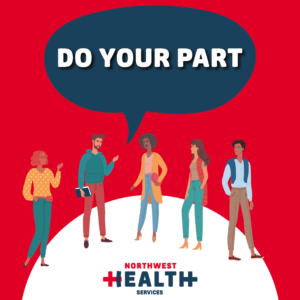 In previous blogs, we’ve mentioned Ending the HIV Epidemic or the EHE Initiative. This was put into place in 2019. The initiative relies on four basic strategies, to achieve our goal of ending the HIV epidemic in the United States by 2030. The four strategies are:
In previous blogs, we’ve mentioned Ending the HIV Epidemic or the EHE Initiative. This was put into place in 2019. The initiative relies on four basic strategies, to achieve our goal of ending the HIV epidemic in the United States by 2030. The four strategies are:
- Diagnose all people with HIV as early as possible.
- Treat people with HIV rapidly and effectively to reach sustained viral suppression.
- Prevent new HIV transmissions by using proven interventions, including pre-exposure prophylaxis (PrEP).
- Respond quickly to potential HIV outbreaks to get needed prevention and treatment services to people who need them.
The first step towards diagnosis is testing/screening. Screening is quick, easy, accessible, and at Northwest Health Services, is offered free** of charge. The CDC recommends HIV testing for everyone between the ages of 13 and 64 at least once in their lifetime. Northwest Health Services follows HRSA guidelines which recommends testing for everyone between the ages of 15 and 64 at least once in their lifetime. If you are within that age range and have not been screened for HIV—Please Do Your Part and schedule a rapid screening today, or watch Northwest Health Services’ social media postings for upcoming screening events in the community.
Step # 2 is treat people who have a diagnosis of HIV. Persons living with HIV no longer face the challenges they did in the 80s and 90s. Today, there are highly effective medications to manage the HIV virus. The most common medication regimen to treat HIV is one pill, once a day—that’s it. In most cases, when medications are taken daily, the person’s viral load is suppressed to an undetectable level within a few short months. When this occurs, the level of HIV virus is so low, it cannot be transmitted, not even through sexual contact. This is called U = U—Undetectable means Untransmittable. By continuing to take the medication daily and following all medical recommendations, persons living with HIV can enjoy long, healthy lives. If someone you know is living with HIV, but is not engaged in care, Please Do Your Part by encouraging them to get established with a Provider, who is specially trained in HIV management.
Step # 3 is prevention of new HIV cases. This, too, can be achieved by taking one pill, once per day. The medication is referred to as “PrEP” which stands for Pre-Exposure Prophylaxis. Simply stated, the PrEP medication is taken daily to prevent the transmission of the HIV virus. This, too, is highly effective. Again, if you may be at risk of contracting HIV, Please Do Your Part by talking to your healthcare provider about testing and (if negative for HIV) a prescription for PrEP. Several Northwest Health Services Providers now prescribe PrEP medication.
Step #4 is to respond to an HIV outbreak within a community. We certainly hope this never occurs in our community. This is why it is extremely important to educate ourselves about the facts of HIV Prevention and HIV treatment/management.
While these 4 steps are equally important in our efforts to end the HIV epidemic, testing is a priority! In the United States, an estimated 1 in 7 individuals living with HIV—does NOT know their HIV status. These individuals (unknowingly) expose others to HIV. It is estimated that 80% of new HIV infections in the U.S. are transmitted from people who were not diagnosed (had not been tested). Again, Please Do Your Part and get screened for HIV.
If I may add a 5th step to ending the HIV epidemic, it would be education. Please Do Your Part and educate yourself about the facts of HIV—Who is at Risk? What is HIV? When should individuals be screened/tested? Where to go for HIV screening and information? Why it is important to take the steps toward ending the HIV epidemic? How is HIV transmitted? How can HIV be successfully treated? How it can be successfully prevented? —answers to all these questions and so much more are available upon request.
**It is important to note that Northwest Health Services offers FREE HIV rapid screenings. Results are available in approximately 15 minutes. However, if the result of the rapid screening is reactive, a blood draw must be completed and sent to another lab where more sophisticated, detailed testing will be completed. Rapid screening is quite accurate, but additional testing must be done before a diagnosis of HIV can be made.
Northwest Health Services is Doing Our Part towards ending the HIV Epidemic:
Northwest Health Services offers free HIV screening during your routine visit with your Northwest Health Provider, or by scheduling a free screening through our website.
Northwest Health Services has several healthcare providers who prescribe PrEP medications for the prevention of HIV (for individuals who are HIV negative). Again, an appointment with a provider for PrEP can be made by phone or requested via our website.
Northwest Health Services has several providers who have completed specialty training to effectively treat individuals living with HIV. Individuals in need of such care can schedule an appointment by phone or via our website.
Northwest Health Services has an HIV Prevention Specialist on staff to provide information and educational materials, answer questions, schedule screenings, and appointments with providers. As you may know, PrEP and HIV medications are VERY expensive. Our Prevention Specialist links patients to available resources to assist patients in obtaining such medications at little, to no out-of-pocket costs.
For more information regarding anything mentioned in this blog or to schedule an HIV screening, please contact Janet Miller, Prevention Specialist @ 816-901-1034.
